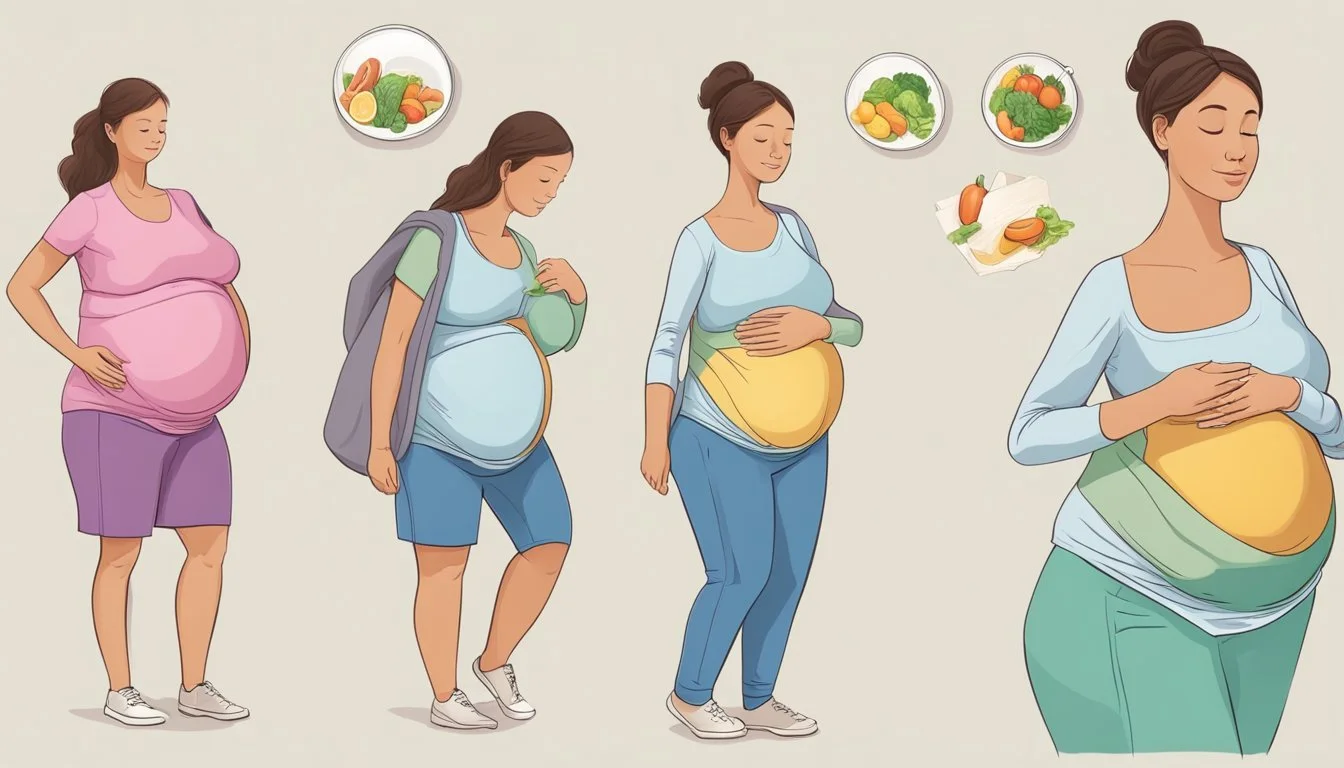Is it Safe to Follow the Atkins Diet During Pregnancy?
Understanding Nutritional Risks
The Atkins Diet, a low-carbohydrate eating plan developed by cardiologist Dr. Robert Atkins in the 1960s, has been a popular method for weight loss and health improvement for decades. The diet emphasizes a reduction in carbohydrate intake, prioritizing protein and fat consumption instead. While this approach has been beneficial for many individuals looking to manage their weight, the question arises about its safety and suitability during pregnancy.
Pregnancy is a critical period where the nutritional needs of the mother and the developing fetus are heightened, requiring a careful balance of vitamins, minerals, and macronutrients. The primary concern with the Atkins Diet during pregnancy is its restrictive nature in the early phases, particularly the induction phase that significantly limits carbohydrate intake. Carbohydrates are a primary energy source and play a vital role in fetal development, making them an important component of a pregnant woman’s diet.
Experts, including Dr. Atkins himself, have advised that pregnant women should avoid the induction phase of the Atkins Diet. Instead, if one chooses to follow the Atkins Diet while pregnant, it is recommended to only engage in the maintenance phase, which allows for a controlled and more balanced intake of carbohydrates. It is essential that any changes to diet during pregnancy be discussed with a healthcare provider to ensure both maternal and fetal health and nutrition needs are met.
Understanding the Atkins Diet
The Atkins Diet is a structured low-carbohydrate eating plan that emphasizes proteins and fats while reducing carb intake. It is designed to trigger weight loss through ketosis, a state where the body burns fat as its primary fuel source.
Principles of the Atkins Diet
The Atkins Diet operates on the principle that by limiting carbohydrates, the body is forced to burn its fat stores for energy, leading to weight loss. The diet is high in protein and fats but low in carbohydrates. It allows for some vegetables, while fruits, grains, and sugars are restricted, especially in the early phases. The diet's approach is aimed at controlling insulin levels, which may result in more effective weight management.
Phases of the Atkins Diet
The Atkins Diet progresses through four distinct phases:
Induction: A highly restrictive phase that permits only 20-25 grams of carbohydrates per day to kickstart weight loss.
Balancing: Gradually more carbs are added back into the diet, including nutrient-dense and fiber-rich foods.
Fine-Tuning: As dieters approach their goal weight, they adjust carb intake to slow weight loss.
Maintenance: A sustainable lifestyle phase where dieters find their optimal balance to maintain their weight.
Typical Foods in the Atkins Diet
During the different phases of the Atkins Diet, certain foods are encouraged while others are limited or excluded:
Protein: Emphasized throughout all phases, including meat, eggs, and fish.
Fats: A variety of fats such as butter, oils, and some high-fat dairy products.
Low-Carb Vegetables: Spinach, kale, and other leafy greens from the start.
Nuts and Seeds: Introduced during the second phase and consumed in moderation.
Fruits and Whole Grains: Allowed in later phases as carb limits are increased, focusing on high fiber options.
Dairy Products: Certain cheeses and other full-fat dairy included early on, with more variety added in later phases.
The Atkins Diet excludes high-carb foods like bread, pasta, and starchy vegetables in the initial phases, and these foods are slowly reintroduced in moderation as a person progresses through the diet.
Nutritional Considerations During Pregnancy
During pregnancy, a woman's body needs additional nutrients, vitamins, and minerals. Adequate dietary intake supports fetal growth and the health of the mother.
Essential Nutrients for Fetal Development
Folate, also referred to as folic acid, is crucial for preventing birth defects of the baby's brain and spine. It is recommended that pregnant women consume 400–800 micrograms (mcg) daily. Iron is necessary for delivering oxygen to the fetus, and pregnant women should aim for about 27 milligrams (mg) per day. Calcium is vital for building the baby’s bones and teeth and requires around 1000 mg daily for a pregnant woman.
Vitamins such as Vitamin D are important to assist the body in calcium absorption and to support the immune system.
Minerals, including iodine, are essential for thyroid function and brain development.
Adjusting Macros for Pregnancy
A balance of macronutrients—carbohydrates, proteins, and fats—is important to meet the increased energy requirements. Typically, an additional 300 calories are needed each day during pregnancy but should come from nutritious sources.
Proteins: Lean meats, eggs, and legumes provide the building blocks for fetal tissue and brain development.
Carbohydrates: Whole grains and vegetables offer energy and are rich in fiber, which can help alleviate constipation.
Fats: Sources like nuts and seeds are important for the baby's brain development but should be consumed in moderation.
Risks of Nutrient Deficiencies
Insufficient intake of essential nutrients can lead to complications. For instance, a deficiency in folic acid can result in neural tube defects, and lack of iron may cause anemia, increasing the risk of premature delivery and low birth weight. To ensure sufficient intake, prenatal vitamins are often recommended as a complement to a balanced diet. Vitamin and mineral supplementation, when needed, can prevent deficiencies and support a healthy pregnancy.
Potential Benefits and Risks of Atkins During Pregnancy
When considering the Atkins diet during pregnancy, it's crucial to assess how its low-carbohydrate approach impacts both maternal and fetal health, specifically regarding weight management, gestational diabetes, and potential health complications.
Weight Management Considerations
The Atkins diet can support weight management by restricting carbs, which may help mitigate obesity risks. However, weight loss is generally not recommended during pregnancy as it can affect fetal development. Therefore, any intent to follow the Atkins diet should be carefully evaluated to ensure adequate nutrient intake and appropriate weight gain in line with prenatal guidelines.
Effect on Gestational Diabetes
A reduction in carbohydrate intake may lead to lower blood sugar levels, potentially influencing gestational diabetes management. Some aspects of the Atkins diet, like the focus on protein and fats, might benefit women who are at risk of developing gestational diabetes by keeping their blood sugar levels stable.
Possible Complications and Precautions
Following the Atkins diet during pregnancy requires careful consideration due to possible health problems. A low-carb diet can lead to:
Constipation, due to lower fiber intake.
Nausea, which might be exacerbated in the first trimester.
Altered blood pressure dynamics.
Moreover, insufficient intake of certain carbohydrates can negatively influence fetal growth and development. It's also important to monitor cholesterol levels as high intakes of fats can affect heart health. Pregnant women should consult healthcare providers before beginning or continuing the Atkins diet to avoid these risks and ensure a balance between maternal and fetal needs.
Dietary Modifications for Pregnant Women
Pregnant women need to ensure a balanced intake of nutrients to support the growth and development of their baby. Adapting the diet to include a variety of wholesome foods and staying hydrated are cornerstones of healthy prenatal nutrition.
Incorporating a Wider Range of Food Groups
A pregnant woman's diet should include a broad spectrum of food groups to meet both her and her baby's nutritional needs. It is essential to consume a balanced mix of:
Fruits and vegetables: At least five portions per day to provide vitamins, minerals, and fiber.
Whole grains: Such as whole grain bread, to supply energy and help with digestion.
Protein: Opt for lean meats, fish, eggs, or plant-based sources like beans and lentils.
Dairy or fortified alternatives: To ensure adequate calcium intake, which is crucial for bone development.
For those following a vegetarian or vegan diet, it is vital to find alternative sources of specific nutrients usually consumed through meats, such as iron, omega-3 fatty acids, and vitamin B12. Incorporation of a daily prenatal vitamin can help fill nutritional gaps.
Consulting with a Dietitian
Pregnant women, particularly those considering specific diets like the Atkins diet, should consult with a dietitian. A dietitian can provide:
Tailored advice on maintaining a balanced diet.
Guidance on essential nutrients and appropriate portion sizes.
Suggestions for meal plans that cater to dietary restrictions, preferences, and nutritional needs.
Staying Hydrated and Managing Cravings
Hydration is critical during pregnancy. Pregnant women should aim to drink approximately:
8 to 12 cups of water per day to support increased blood volume and amniotic fluid.
Managing cravings during pregnancy can be challenging, but they can often be mitigated by:
Eating small, frequent meals to maintain blood sugar levels.
Opting for nutritious alternatives that satisfy both the craving and nutritional needs.
Limiting high-sugar and high-fat snacks that offer less nutritional value.
Exercise and Physical Activity Recommendations
During pregnancy, integrating exercise can boost energy, support overall health, and manage weight gain. However, it is crucial to adapt physical activity to the changing circumstances of pregnancy.
Safe Exercise Practices During Pregnancy
Pregnant individuals should consider low-impact activities such as walking, swimming, or prenatal yoga. It's essential to stay hydrated, avoid overheating, and listen to the body, ceasing exercise if discomfort or fatigue occurs. Avoid contact sports and any activity with a risk of falling. The American Pregnancy Association recommends at least 150 minutes of moderate-intensity aerobic activity each week.
Low-Impact Activities Recommended:
Walking
Swimming
Prenatal yoga
Activities to Avoid:
Contact sports
Activities with fall risk, like horseback riding or skiing
Combining Diet with Physical Activity
While on the Atkins diet during pregnancy, one should ensure adequate energy and nutrient intake to meet the increased demands of pregnancy. Carbohydrates provide energy for both mother and fetus, especially during exercise. Therefore, close attention to nutrition is necessary - possibly with the guidance of a healthcare provider - to balance the Atkins diet's lower carb intake with the energy needs of pregnancy.
Key Considerations for Combining Atkins Diet and Exercise:
Monitor carbohydrate intake to ensure energy needs are met.
Consult a healthcare provider for personalized dietary adjustments.
Prioritize nutrients that support fetal development.
Post-Pregnancy: Transitioning from Atkins
Transitioning back to a regular diet from the Atkins after pregnancy involves a focus on breastfeeding requirements and long-term health. The process often requires a gradual shift to ensure all nutritional needs are met.
Breastfeeding and Nutrient Demands
While breastfeeding, women have increased nutritional needs. Breast milk production demands extra calories and essential nutrients, often necessitating a more balanced approach than the restrictive phase of Atkins. A diet rich in vitamins, minerals, and healthy fats supports both the mother and the baby's development. Foods such as leafy greens, whole grains, and lean proteins are emphasized.
Phased Approach to Postpartum Weight Loss
Postpartum weight loss should be a gradual process, integrating the phased approach of the Atkins diet. Women may consider starting with a modified version of the Atkins maintenance phase that balances carbs with protein and fats, then carefully adding more whole food sources of carbohydrates as they transition away from the diet. It is essential to prioritize nutrition over rapid weight loss to support recovery and breastfeeding.
Phase Carbohydrates Protein Fats Initial Postpartum Period Increased for milk production Sufficient quantity Focus on healthy fats Weight Loss Transition Slowly reintroduce more carbs Maintain levels Adjust as needed Long-Term Maintenance Balance with activity Ensure adequacy Continue healthy types
Long-Term Dietary Considerations
After completing breastfeeding or reaching postpartum weight goals, long-term healthy eating patterns should be adopted. The focus should shift to a balanced diet, as recommended by dietary guidelines, ensuring sustained health and wellness. Whole foods, fruits, vegetables, lean proteins, and whole grains should form the cornerstone of one's long-term eating plan. A sustainable approach to carbohydrate intake can provide the necessary energy while maintaining healthy weight maintenance.
Conclusion
Pregnant women are advised to prioritize a healthy lifestyle, including safe diet practices that support fetal growth and maternal health. Consulting with a dietitian or healthcare provider is crucial before making dietary changes.
The Atkins Diet, primarily known for its low carbohydrate approach, does pose potential concerns during pregnancy. The maintenance phase, allowing a controlled number of carbohydrates, is considered preferable if one chooses to follow the Atkins regimen. It’s important to note:
The induction phase of the Atkins Diet is not recommended during pregnancy.
A balanced intake of carbohydrates, proteins, and fats is essential for the developing fetus.
Here's a simple table to summarize the key points:
Aspect Consideration During Pregnancy Carbohydrate Intake Adequate levels needed for fetal development Induction Phase Should be avoided due to extreme low carb limits Dietary Monitoring Regular check-ups with a healthcare professional are recommended
Careful consideration of nutritional needs is vital, with particular attention to folate, iron, calcium, and fiber intake. Due to potential restrictions in the Atkins Diet, it may not align with prenatal nutritional requirements. Therefore, they should consider dietary patterns that support pregnancy, like the Mediterranean diet or a well-balanced diet with limited sugars. It's imperative to focus on nutrient-rich foods rather than restrictive dieting or weight loss during this critical time.






